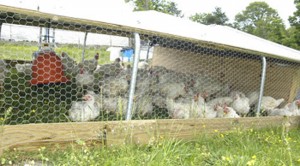As the price of imported feed continues to spiral on the back of rising oil prices, another increase in the price of chicken is on the horizon according to Managing Director of Bounty Farms Ltd, Peter deGroot.
According to deGroot, sharp increases in rice prices over the past eighteen months have forced local poultry producers to resort to corn as the feed base for poultry. DeGroot said that while it had become less expensive to import corn than to use locally produced rice, corn prices too had more than doubled, “The problem has to do with the fact that with more corn now being used in the manufacture of ethanol the price continues to climb. Traditionally, we have used broken rice in the poultry industry but much of that rice is now being exported to replace corn in the manufacture of cereals. In the past broken rice was regarded as a by-product of the industry and there were hardly any markets for the product. While we were able just over a year ago to purchase broken rice at $12 per pound the current price is $45,” deGroot said.

Meanwhile, deGroot told Stabroek Business that Bounty Farms is part of a regional initiative driven by the Caribbean Poultry Association (CPA) to conduct trials in the cultivation of crops to support the feed needs of the local poultry sector. DeGroot disclosed that Bounty Farms will commence local trials in corn and soya bean cultivation in the intermediate savannahs beginning in October this year. He said that the company had previously been involved in a similar initiative six years ago but that low prices made the venture uneconomical at that time. “With price levels where they are today it is now more economical to embark on such a venture,” he added. He said that apart from corn and soya the experimental project was also examining the feasibility of cultivating cassava and sorghum for use as feed in the poultry industry. DeGroot told Stabroek Business that the experimental production of crops for use in the poultry industry was also taking place in other parts of the Caribbean including Trinidad and Tobago, Barbados and Jamaica. Funding for the trials is being made available through a donor agency.
Bounty Farms is the largest poultry producer in Guyana with more than 40 contract farmers producing chicken for the company. Bounty Farms rears around 12 per cent of its chickens.






